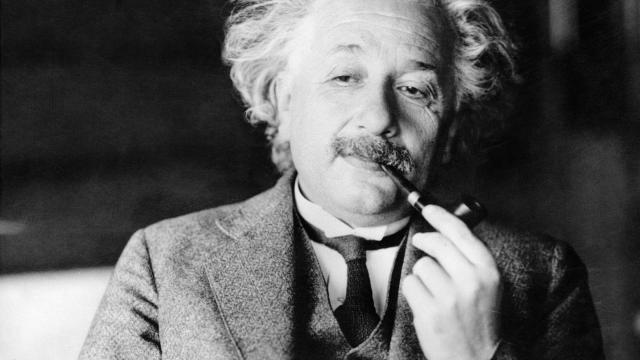A decade before Adolf Hitler rose to power in Germany, famed physicist Albert Einstein was already sensing imminent peril for his country and his own welfare, as a newly discovered letter reveals.
As reported by the Associated Press, the previously unknown letter was recently brought forward by an anonymous collector. The handwritten note, dated August 12, 1922 and signed by Albert Einstein, was addressed to the famed physicist’s sister, Maja.
Next week, the letter will be auctioned off by the Kadem Auction House, and it’s expected to fetch anywhere from between $US15,000 ($20,698) to $US20,000 ($27,598).
The letter is interesting both for its timing and content. Einstein wrote the note after fleeing Berlin out of concerns for his safety. The Jewish-German Foreign Minister, Walter Rathenau, had just been assassinated by a trio of far right anti-Semitic Germans. After the killing, police warned Einstein that his life could be in danger, and they advised him to stop lecturing and even leave Berlin.
The physicist heeded their warnings, and he moved north out of the city, possibly to Kiel, where he may have written this letter, according to a Kadem press release.
“Nobody knows where I am,” he wrote to his sister in the letter, “and I’m believed to be missing.”
As the note shows, Einstein was worried about burgeoning anti-Jewish feelings in Germany and the country’s uncertain future.
“I am doing quite well, in spite of all the anti-Semites among my German colleagues,” he wrote. “I’m very reclusive here, without noise and without unpleasant feelings, and am earning my money mainly independent of the state, so that I’m really a free man.”
Einstein wrote the letter four years after the defeat of Germany in the First World War. The nation was in turmoil, with different political factions vying for power. A militant far right had emerged, who blamed the 1918 defeat on “backstabbing” generals, the influence of Bolshevism (Russian communism), and Jews.
In 1923, the year after Einstein wrote this letter to his sister, Adolf Hitler staged his infamous coup attempt in Munich — the Beer Hall Putsch. Hitler was arrested after a thousand Nazis failed to seize power, and he was given a five-year prison sentence for treason. He served just nine months, but the incident brought Hitler national attention. By 1933, the former soldier had taken control of the nation, transforming it into a fascist, rabidly anti-Semitic police state.
A year before the Beer Hall Putsch, however, Einstein was already feeling grim about his country’s future. “Here are brewing economically and politically dark times,” he wrote, “so I’m happy to be able to get away from everything for half a year.”
Einstein, who harboured left-leaning political positions and visions of a global government, told his sister he wasn’t interested in accepting a university tenure abroad, but he said he “had to join” a League of Nations commission (a forerunner to the United Nations), which “naturally upsets the people here,” he wrote, adding that, “There was nothing I could do about it if I didn’t want to be unfaithful to my ideals.”
Recognising his rising importance as a public figure, Einstein wrote that he was “about to become some kind of itinerant preacher,” a prospect he deemed both “pleasant” and “necessary.” Despite his gloomy forecast, he did his best to assuage his sister’s concerns.
“Don’t worry about me,” he wrote, “I myself don’t worry either, even if it’s not quite kosher; people are very upset,” to which he added, “In Italy, it seems to be at least as bad, by the way.” Indeed, the situation in Italy — the birthplace of fascism — was equally tenuous.
Later in 1922, Einstein delivered a series of lectures in Japan, and went on a long journey through Asia. It was during this period that Einstein was notified that he was the winner of the Nobel Prize for physics.
Eleven years later, with the Nazis in power, the introduction of repressive laws resulted in the removal of Jews from public posts, including university positions. These laws affected Einstein as well, with the Nazi regime dismissing his Theory of Relativity as “Jewish physics.”
It was this irrational hatred against Jews and all things Jewish, however, that likely discouraged the Third Reich from launching a program on the scale of the Manhattan Project to develop the atomic bomb, instead choosing to build “super weapons” like jet aircraft and long-range guided ballistic missiles, according to the Atomic Heritage Foundation, which notes that while the Nazis did have a program to build the bomb, many historians feel it was a half-hearted effort with very little political support.
When Hitler rose to power, Einstein happened to be outside of the country on a lecture tour. He wisely decided not to return home, renouncing his citizenship and eventually settling in the United States. He accepted a position in the Institute of Advanced Study at Princeton, where he worked until his death in 1955.
